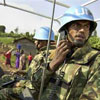
Last week, the New York Times, Human Rights Watch, and the Enough Project provided detailed accounts of the summary executions of an estimated 150 civilians by rebel leader Laurent Nkunda’s CNDP militia in the key town of Kiwanja in eastern Congo. While the rebels terrorized the population of Kiwanja in what HRW called “one of the worst killing sprees” in North Kivu province in the past two years, a contingent of over 100 U.N. peacekeepers was stationed less than a mile away. The New York Times called the Kiwanja massacre a “textbook example” of the continuing failure of MONUC (Mission of the United Nations Organization in the Democratic Republic of the Congo), the world’s largest international peacekeeping force, to protect Congolese people.
Some have already characterized MONUC’s tragic failure in Kiwanja as a “lack of capacity” problem among UN peacekeeping missions. I agree with UN Dispatch blogger Mark Leon Goldberg, who argues that Kiwanja should not be used as a chance to rant against UN peacekeeping. However, an Enough Project report released yesterday makes the important argument
When the Security Council renews MONUC’s mandate (pdf) this month, it must work with troop-contributing countries to make explicit that peacekeepers can and should use deadly force to defend civilians against armed groups (including the predatory Congolese army). Furthermore, the Security Council should make clear that failure to execute this mandate will not be tolerated.
On the subject of political will, it should be noted that MONUC will yet again be left out to dry unless the international community throws its full weight behind sustained diplomatic efforts to deal with the root causes of the chronic crisis in Congo: the FDLR, the illicit trade in minerals, longstanding land and citizenship issues, and the war economy that has allowed warring parties — including regional governments — to reap profits from the warfare in Congo for over a decade.
This post orginally appeared in the Wonk Room at the Center For American Progress Action Fund.

